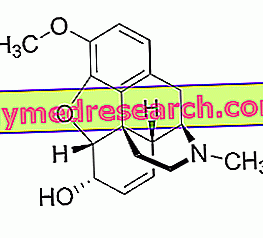Generality
Codeine is a natural alkaloid that is extracted from the opium poppy. From the chemical point of view, codeine can be considered as a derivative of morphine (another natural alkaloid present in the opium poppy).

Codeine - Chemical Structure
Despite its availability in nature, at present, codeine is mainly produced synthetically.
This active ingredient is used in the pharmaceutical field for its properties
- analgesics (for this purpose it is generally used in association with other NSAIDs, especially paracetamol)
- antitussive (generally used alone).
Examples of medicinal specialties containing Codeine
- Codamol ® (in combination with paracetamol).
- Co-Efferalgan ® (in association with paracetamol).
- Paracodina ® (in the form of dihydrocodeine).
- Tachidol ® (in combination with paracetamol).
Therapeutic indications
The use of codeine is indicated for the treatment of painful states of different nature and entity, and to quell the cough.
Warnings
Since codeine can cause dependence, it is absolutely necessary to follow the instructions given by the doctor scrupulously during treatment with the drug. Both in terms of the amount of drug to be taken and the frequency of administration and the duration of the treatment.
Codeine should be used with great caution in elderly patients, since - in this category of patients - it could aggravate pre-existing disorders (such as, for example, difficulty in passing urine, brain disorders, etc.).
Codeine must be taken on a full stomach. Also, during treatment with this drug, alcohol consumption should be avoided .
Before starting the treatment with codeine it is necessary to inform your doctor if you suffer from asthma or pulmonary emphysema, since the drug can aggravate the breathing difficulties caused by these diseases.
Codeine can cause side effects such as drowsiness and sedation, therefore it is not recommended to drive vehicles and / or use machines after taking the drug.
Interactions with other drugs
Concomitant administration of codeine and other opioid analgesics should be avoided. The simultaneous intake of codeine and tricyclic antidepressants (such as imipramine, clomipramine and amitriptyline) should also be avoided.
Furthermore, the use of codeine should be avoided if you take - or have been taken in the last two weeks - monoamine oxidase inhibitors (or MAOIs, drugs used to treat depression and Parkinson's disease).
A lot of caution should be used and - if possible - the concomitant administration of codeine and other drugs capable of exerting a depressive action on the central nervous system, such as sedative-hypnotic, anxiolytic and antihistamine drugs should be avoided.
In any case, it is advisable to inform your doctor if you are taking - or have recently been - medicines of any kind, including medicines without a prescription and herbal and homeopathic products.
Side effects
Codeine can induce different types of side effects, although not all patients experience them. This depends on the different sensitivity that each individual has towards the drug. Therefore, it is not said that the adverse effects occur all with the same intensity in each person.
Listed below are the main side effects that may occur during treatment with codeine.
Gastrointestinal disorders
Gastrointestinal symptoms may occur during codeine therapy, such as:
- Nausea;
- He retched;
- Constipation;
- Acute pancreatitis.
Nervous system disorders
Sedation and drowsiness are very common during codeine treatment. In addition, the drug can cause fatigue, headache, dizziness and agitation (the latter effect occurs mainly in elderly patients).
Kidney and urinary tract disorders
Urinary retention may occur during codeine therapy.
Overdose
If excessive doses of codeine are taken, symptoms such as:
- Respiratory depression;
- Reduction of arterial pressure;
- Miosis (narrowing of the pupil);
- Diuresis reduction;
- Lowering body temperature;
- Pulmonary edema;
- Deep Coma.
In the event of an overdose of codeine it is essential to immediately restore lung function. The antidote par excellence, in these cases, is naloxone (an opioid receptor antagonist μ) which must be administered intravenously.
In any case, if codeine overdose is suspected, it is necessary to immediately contact the doctor and go immediately to the nearest hospital.
Action mechanism
Codeine, once taken, undergoes hepatic metabolism and is converted to morphine and other metabolites.
Both codeine and morphine are selective opioid μ receptor agonists. These receptors are involved in the modulation of neurotransmission of pain and their activation induces analgesia.
Codeine - and in particular morphine deriving from its metabolism - as an agonist of the aforementioned receptors, is able to activate them thus exerting a pain-relieving action.
Furthermore, codeine acts centrally, depressing the nerve center of the cough. In doing so, the drug performs an antitussive action.
Method of use and dosage
Codeine is available for oral administration (alone or in combination with other drugs) in the form of tablets, oral drops, syrup, effervescent tablets and effervescent granules. Furthermore, it is also available for rectal administration in the form of suppositories in association with the fluid extract of Edera helix (a plant with expectorant properties).
The amount of codeine to be taken, the frequency of administration and the duration of treatment must be established by the doctor according to the type of illness that must be treated (painful states or cough) and according to the age of the patient.
Pregnancy and breastfeeding
Codeine is able to cross the placenta, therefore it could cause damage to the fetus; more in detail, it could cause respiratory depression. For this reason, the drug can be used in pregnant women only in cases of absolute necessity and only under the strict supervision of the doctor.
Furthermore, codeine is excreted in breast milk, therefore its use by breastfeeding mothers is contraindicated.
Contraindications
The use of codeine is contraindicated in the following cases:
- In patients with known hypersensitivity to the same codeine;
- In patients with severe hepatocellular insufficiency;
- In patients suffering from respiratory failure;
- In patients suffering from chronic constipation;
- In patients who are taking other opioid analgesics;
- In patients recently treated with MAOI;
- During breastfeeding.



